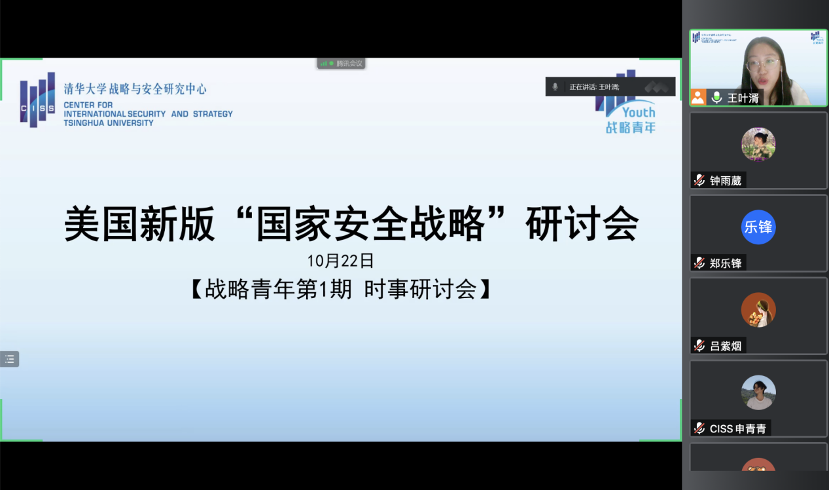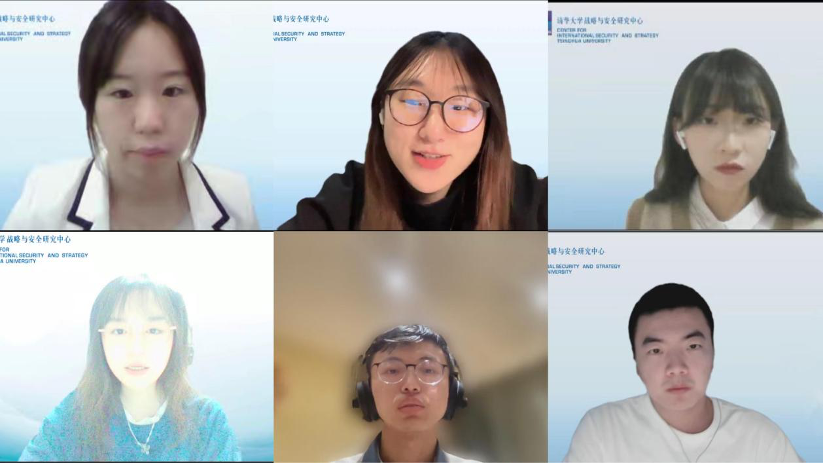On October 22, 2022, CISS Youth held a seminar on the new US National Security Strategy. 44 CISS Youth members from Tsinghua University, Peking University, the University of International Relations, Columbia University, the University of Chicago, and other institutions participated in this event in an in-person or virtual format. The seminar, moderated by Wang Yexu, secretary general of CISS Youth, featured Da Wei and Xiao Qian, director and deputy director of the Center for International Security and Strategy (CISS) of Tsinghua University; An Gang, CISS expert; and CISS fellows Sun Chenghao and Song Bo.

Ms. Xiao Qian kicked off the seminar with her opening remarks. She welcomed the new cohort of CISS Youth members, and pointed out that the seminar was a timely response to the fresh developments in current events. She encouraged the participants to enhance their perception of the international situation by perusing key reports and conducting comparative studies, and expressed the hope that the seminar would be rewarding for them.

In the thematic session, six CISS Youth members spoke on the new US National Security Strategy, which was released on October 12, each presenting a different analytical perspective. Zhao Yuqi took the topic of “The 3As Strategy: Ambitious, Aggressive, Ambiguous” to explore the report’s analysis of America’s strategic objectives, means and expectations. Cai Yihang looked into the variables and constants in the US Indo-Pacific strategy, noting that the US has increased its investment in the Indo-Pacific, which strengthened its justification for its behavior in the region, whereas what has not changed is its intention to maintain its alliances and counter China. Lyu Ziyan focused on the positive and negative implications of the new National Security Strategy for Asian countries, saying that the US failed to explain how it could cooperate with China on addressing global challenges while advocating competition with it. With the theme of “The New NSS Is Reflecting the Biden Administration’s Strategic Tenets,” Zhang Ding explored America’s global strategic goals, regional priorities and path of “dialogue and competition” in the context of the launch of the strategy. Taking military technology and geopolitics as an entry point, Gao Peng analyzed the Biden administration’s intention and paths to strengthen strategic alliance systems from the perspectives of historical logic and great-power strategic competition. Niu Ze focused on the ideological competition between the US and Russia, and highlighted the importance of understanding the mindset of the opponent and the cognitive structure of public opinion in a “strategic competition,” taking into account the different mentalities of the public and government of the two countries.

In the commentary session, Mr. An Gang expressed his appreciation for the young participants’ vision and broad knowledge base, and suggested that they conduct systematic analyses from both historical and realistic perspectives when studying important documents to identify their internal logic. Mr. Sun Chenghao commented on each of the CISS Youth member’s presentation and encouraged them to explore ways to weave the fabrics of people-to-people connections between China and the US. Ms. Xiao Qian encouraged the members to carry out long-term research, learning and application of their know-how, and Mr. Da Wei encouraged them to stay committed to making first-hand and down-to-earth observations about China while keeping in mind that strategies always come from competition and that knowing oneself and one’s opponent is the only way to win.

In the discussion session, Wang Yexu, Cui Chenshuo, Gao Peng, Wu Fan and other participants looked at the paradoxes and contradictions in the new US National Security Strategy, the concept of “integrated deterrence,” the shift in US strategy, and new forms of US alliances.
To further showcase the CISS Youth perspectives, a special compilation of the seminar will be published in our America Watch section. Stay tuned!
CISS Youth, a special project led by CISS, is dedicated for research exchanges among young students and professionals in the field of international studies. It is independently organized by its members through lectures, seminars, roundtables, large-scale annual forums, etc. CISS Youth seeks to foster young students and scholars with a global and strategic vision who will grow into active players in the international arena. The project also serves as a referrer and funder for outstanding members to observe and speak at international forums as the voice of China telling its stories.
